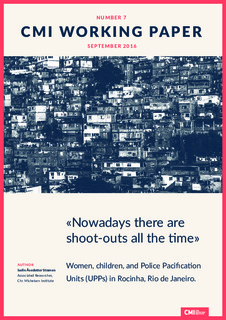| dc.contributor.author | Strønen, Iselin Åsedotter | |
| dc.date.accessioned | 2018-01-04T08:21:22Z | |
| dc.date.available | 2018-01-04T08:21:22Z | |
| dc.date.issued | 2016-09-01 | |
| dc.identifier | oai:www.cmi.no:5934 | |
| dc.identifier.citation | Bergen: Chr. Michelsen Institute (CMI Working Paper WP 2016:7) 28 p. | |
| dc.identifier.isbn | 978-82-8062-604-2 | |
| dc.identifier.issn | 0804-3639 | |
| dc.identifier.uri | http://hdl.handle.net/11250/2475201 | |
| dc.description.abstract | Executive summary
This CMI Working paper explores the implementation of the Brazilian government’s favela (shantytown) policing program, Unidades de Pacificacion Policiais (UPP) or The Pacifying Police Units, from the point of view of women in Rocinha, Rio de Janeiro. It also offers ethnographic insights into how the presence of the UPP affects children.
The paper’s main contention is that the incursion of the UPPs in Rocinha since 2011 has produced a volatile and unpredictable violent dynamic between drug gangs and the police. People, including children, experience having their everyday life disrupted by the risk of being caught in cross fire between drug gangs and the police. Moreover, historically rooted high levels of mistrust towards the police remain, in spite of the attempts to re-brand the UPPs as a new form of inclusive community policing; many people would prefer that the drug gangs took control over the favela again rather than the police. These findings indicate that UPP in Rocinha have not succeeded in instilling an enhanced perception of citizen security, or in fomenting bonds of trust and cooperation.
These findings are discussed in light of the historical asymmetry in the distribution of rights and duties amongst Brazilian citizens, as well as the structural discrimination and marginalization of people from the favelas. Concurrently, it is argued that by addressing these aspects in depth a substantial and humanist security paradigm can emerge.
“The UPPs represent the consolidation of the pact between the Military Police and the citizens, to whom we must destine the best of our efforts. Besides hope and citizenship, UPP symbolizes all the appreciation we have for human life.”
Official web page for Rio’s Police Pacification Units (UPP) 1
“When it was only the bandidos here, people respected the laws out of fear. There weren’t thieves or rapists, everyone followed the laws t | |
| dc.language.iso | eng | |
| dc.publisher | Chr. Michelsen Institute | |
| dc.relation | CMI Working Paper | |
| dc.relation | WP 2016:7 | |
| dc.relation.ispartof | CMI Working Paper | |
| dc.relation.ispartofseries | CMI Working Paper WP 2016:7 | |
| dc.relation.uri | https://www.cmi.no/publications/5934-nowadays-there-are-shoot-outs-all-the-time-women | |
| dc.subject | Favela | |
| dc.subject | Rio De Janeiro | |
| dc.subject | Police | |
| dc.subject | Rocinha | |
| dc.subject | Women | |
| dc.subject | Children | |
| dc.subject | Security | |
| dc.subject | Police Pacification Units | |
| dc.subject | UPP | |
| dc.subject | Brazil | |
| dc.title | «Nowadays there are shoot-outs all the time». Women, children, and Police Pacification Units (UPPs) in Rocinha, Rio de Janeiro. | |
| dc.type | Working paper | |
